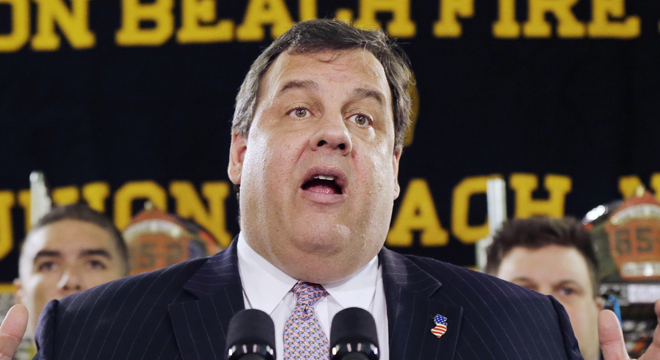At a press conference Tuesday afternoon, New Jersey Gov. Chris Christie (R) called for a special election to replace the late Democratic Sen. Frank Lautenberg to be held on Oct. 16. A primary will take place on Aug. 13. Christie will appoint an interim replacement to serve in Lautenberg’s Senate seat until the election is concluded. Though he did not reveal whom he plans to choose, his deft handling of the situation has already allowed Christie to sidestep several potentially sticky situations and may have created an obstacle for one of his top rivals.
Prior to his announcement, Christie was seen as having multiple options for scheduling the Senate election. One statute was reportedly cited by Jersey Republicans as giving Christie power to appoint a replacement who would serve the remainder of Lautenberg’s original term, which ends in 2014. Christie said he did indeed have this power, but wanted to do the “right thing” and let the people of the Garden State pick their representatives in the Senate.
“Yes, New Jersey statute does allow me to name an appointment to serve for the remainder of Senator Lautenberg’s term,” Christie said. “But I firmly believe that the decisions that need to be made in Washington are too great to be determined by an appointee for a period of 18 months. We must allow our citizens to have their say over who will represent them in the Senate for the majority of the next year-and-a-half. People of New Jersey deserve to have that voice.”
Christie’s decision also allows the governor to sidestep a series of problems the vacancy in Lautenberg’s seat presented to his current re-election bid and rumored national ambitions.
Though he’s well ahead in his campaign for a second term, Jersey political insiders speculated Christie would prefer not to see his race end on the same day as a Senate contest as it might cause increased turnout that could eat into his lead or put undue strain on relationships he has built with Democratic allies.
At his press conference, Christie was asked multiple times about why he chose to have a special election, which costs extra money for the state, rather than pairing the Senate vote races in November. Christie repeatedly referred to the fact state law gives him power to schedule a special to fill Senate vacancies if he deems it “advisable.” He also noted the state law requires the primary to be held within 76 days of the final announcement on how the Senate seat will be filled. In order not to prolong revealing plans for the race and to give candidates time to prepare, Christie said he thought calling for a special election was both “advisable” and “necessary.”
“The dates in the statute don’t permit it to happen in the general election,” said Christie. “There’s no political purpose to this. … The option to have it on the general election is not an option.”
Though Christie repeatedly insisted political factors didn’t motivate his decision, the announcement complicates the senatorial ambitions of Jersey’s most high-profile Democrat: Newark Mayor Cory Booker. When he announced his intention to consider a Senate campaign last December, Booker vowed to “complete my full second term as mayor” first. Unless Booker wants to challenge an incumbent in 2014, he will now be forced to break that promise to run for the seat. This roadblock probably won’t be sufficient to severely impact Booker’s stance as the heavy favorite among potential Democratic contenders, but it will give his rivals from both parties an easy line of attack.
The decision also opens Christie up to criticism he is unnecessarily spending money on the cost of a special election. Within an hour of Christie’s speech, the Democratic Governor’s Association released a statement accusing Christie of putting his political needs ahead of the taxpayers.
“Governor Christie might not know or care how many millions of taxpayer dollars his special election gambit will waste, but the people of New Jersey certainly do,” the statement said. “Christie should do the right thing, protect New Jersey taxpayer dollars instead of his own political career, and hold the Senate election on the same day as his own.”
While other similar attacks are likely to come down the road, Christie’s masterstroke of election scheduling comes with a potent, built-in defense that he is simply standing up for the needs of the voters.
While it would seem having a handpicked senator as long as possible could be advantageous to Christie, making an appointment who serves for the absolute minimal amount of time came with a third side benefit for the governor. Christie has turned himself into a highly touted potential 2016 presidential contender based in no small part on his image as a GOP governor who isn’t afraid to make compromises with the other party. If he made a pick that would serve for a substantial amount of time and they were seen as insufficiently conservative it could damage Christie’s standing with Republicans nationally, while an unequivocally conservative pick could hurt Christie’s bipartisan branding. Allowing his choice to serve for only a few months will almost assuredly burnish Christie’s magnanimous reputation while also decreasing the spotlight on the appointment — and the chance it could reflect negatively on him.
Though he promised he would announce his pick “quickly” and have someone in place by next week, Christie said he was not ready to reveal a name just yet.
“I haven’t made my decision about who it will be,” said Christie. “I do have a preference for one party over the other, so that might color my judgment a little.”






